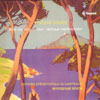D'Indy Diptyque méditerranéen; Istar; Poème des rivages
The mellow fruits of a late love show everything’s fine and D’Indy
View record and artist detailsRecord and Artist Details
Composer or Director: (Paul Marie Théodore) Vincent D'Indy
Genre:
Orchestral
Label: Timpani
Magazine Review Date: 13/2006
Media Format: CD or Download
Media Runtime: 64
Mastering:
Stereo
Catalogue Number: 1C1101

Tracks:
| Composition | Artist Credit |
|---|---|
| Diptyque méditerranéen |
(Paul Marie Théodore) Vincent D'Indy, Composer
(Paul Marie Théodore) Vincent D'Indy, Composer Emmanuel Krivine, Conductor Luxembourg Philharmonic Orchestra |
| Istar |
(Paul Marie Théodore) Vincent D'Indy, Composer
(Paul Marie Théodore) Vincent D'Indy, Composer Emmanuel Krivine, Conductor Luxembourg Philharmonic Orchestra |
| Poème des rivages |
(Paul Marie Théodore) Vincent D'Indy, Composer
(Paul Marie Théodore) Vincent D'Indy, Composer Emmanuel Krivine, Conductor Luxembourg Philharmonic Orchestra |
Author: Ivan March
Vincent d’Indy is another late-19th/early-20th-century composer who is all but forgotten. A Franck and Wagner disciple, he reacted obstinately against “modern” contemporaries, even Ravel, although he admired the Debussy of L’après-midi and the Nocturnes.
The widowed D’Indy fell ardently in love, which was reciprocated, with a student 36 years his junior and the straitlaced Roman Catholic musician suddenly acknowledged the underlying sensuality of his nature. He was already working on the Poème des rivages but the music’s pantheistic feeling blossomed when he and his young bride went to live at Agay on the Mediterranean. The rich orchestral colours of these four seascapes develop an expressive radiance in his luminous scoring. It is not another La mer, for the third-movment Scherzo wittily evokes a country train journey. But the final scene, “Le mystère de l’océan”, depicts the sea’s unpredictability and violence. The Diptyque méditerranéen followed, a mellow view of two landscapes seen from his home. But the impressionism is less potent than in the sea evocations.
Istar tells of the Assyrian godess who (like Orpheus and Eurydice in reverse) seeks to retrieve her lover from the realm of the dead. She must pass through six doors, at each removing a garment, until, naked, she reaches her destination. The work is a set of variations using a simple three-note motif as a basis and Krivine makes the most of its sensuous feeling. All three performances are of a high order: the Luxembourg Philharmonic Orchestra are at home in these scores and their conductor finds moments of genuine rapture.
The widowed D’Indy fell ardently in love, which was reciprocated, with a student 36 years his junior and the straitlaced Roman Catholic musician suddenly acknowledged the underlying sensuality of his nature. He was already working on the Poème des rivages but the music’s pantheistic feeling blossomed when he and his young bride went to live at Agay on the Mediterranean. The rich orchestral colours of these four seascapes develop an expressive radiance in his luminous scoring. It is not another La mer, for the third-movment Scherzo wittily evokes a country train journey. But the final scene, “Le mystère de l’océan”, depicts the sea’s unpredictability and violence. The Diptyque méditerranéen followed, a mellow view of two landscapes seen from his home. But the impressionism is less potent than in the sea evocations.
Istar tells of the Assyrian godess who (like Orpheus and Eurydice in reverse) seeks to retrieve her lover from the realm of the dead. She must pass through six doors, at each removing a garment, until, naked, she reaches her destination. The work is a set of variations using a simple three-note motif as a basis and Krivine makes the most of its sensuous feeling. All three performances are of a high order: the Luxembourg Philharmonic Orchestra are at home in these scores and their conductor finds moments of genuine rapture.
Explore the world’s largest classical music catalogue on Apple Music Classical.
Included with an Apple Music subscription. Download now.

Gramophone Digital Club
- Digital Edition
- Digital Archive
- Reviews Database
- Events & Offers
From £9.20 / month
Subscribe
Gramophone Club
- Print Edition
- Digital Edition
- Digital Archive
- Reviews Database
- Events & Offers
From £11.45 / month
Subscribe
If you are a library, university or other organisation that would be interested in an institutional subscription to Gramophone please click here for further information.






